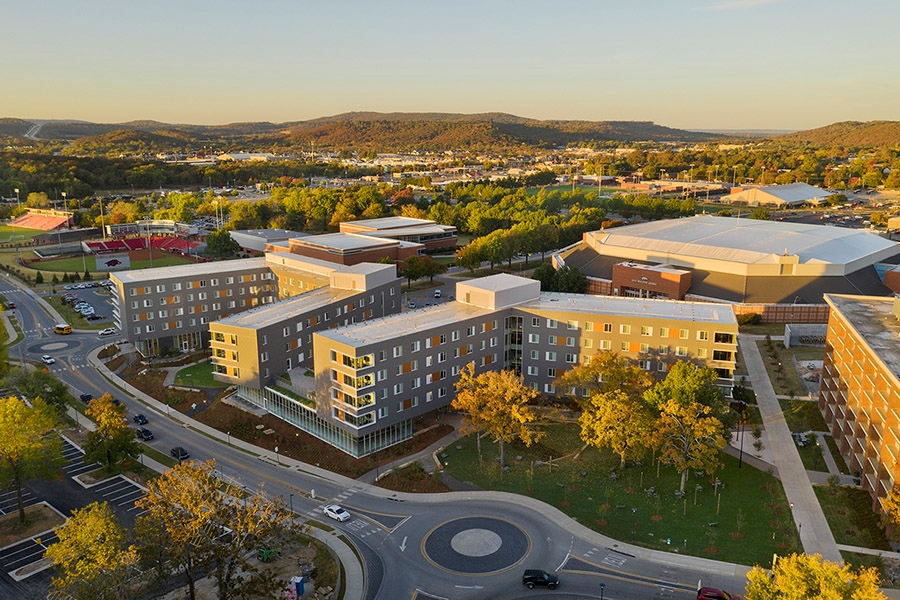
Three projects with ties to the U of A were shortlisted in the 2020/2021 World Architecture Festival Awards program, the world's largest architecture design awards program serving the global community.
Adohi Hall on the U of A campus in Fayetteville was one of 18 projects shortlisted in the “Housing–Completed Buildings” category and was one of eight shortlisted for the “Best Use of Certified Timber” prize. The project was conceived and designed by a design collective led by Leers Weinzapfel Associates of Boston, Modus Studio of Fayetteville, Mackey Mitchell Architects of St. Louis and OLIN of Philadelphia. Modus Studio was founded by Chris Baribeau and Josh Siebert, Fay Jones School of Architecture and Design alumni.
The Thaden School Reels Building and the Thaden School Bike Barn were among 18 projects shortlisted in the “School–Completed Buildings” category. Both projects were designed by Marlon Blackwell Architects in Fayetteville, the professional design firm led by Marlon Blackwell. He is the E. Fay Jones Chair in Architecture and a Distinguished Professor in the Fay Jones School.
“The recognition of Arkansas-based projects in the international field of the World Architecture Festival is extraordinary,” said Peter MacKeith, dean of the Fay Jones School. “Entries are submitted from around the world, and to have our projects included as finalists amidst such competition — often as the only representative project from the United States in a given category — affirms the larger ‘design excellence project’ of the university and the region.”
Adohi Hall is a 202,027-square-foot, 708-bed sustainable residence hall and living-learning community at the U of A, as well as the nation's first large-scale mass timber project of its kind. An emphasis on nature resonates throughout the project, with exposed structural wood ceilings and wood columns present throughout the building. A serpentine band of student rooms defines three distinctive courtyard spaces that create a dynamic environment for interactive learning in architecture, design and the arts. Integrated into the topography of its site, Adohi Hall features a cascading series of outdoor spaces with sinuous pathways intricately woven through existing stands of mature oak trees.
The impact of the new complex extends beyond the student and campus community. The innovative use of mass timber construction makes a broader statement about Arkansas’ commitment to sustainable, equitable and just development. The name of the new complex — Adohi — is a Cherokee word meaning “woodlands” or “coming into the forest.” Selected in consultation with the Cherokee Nation, this name recognizes the importance of timber and environmental stewardship in the design and honors the cultural contributions of Native peoples in the area.
“Adohi Hall’s recognition for both excellence in housing design and excellence in timber design is doubly rewarding, given the university’s commitment to on-campus housing and to being a leader in mass timber design and construction,” MacKeith said. “Besides the architecture, landscape architecture and construction team, credit is due to University Student Affairs, University Housing and University Facilities Management for their commitment to design excellence in this project.”
The Thaden School is a new independent middle and high school in Bentonville that is endowed and structured to allow students from all socio-economic backgrounds to attend. The unique curriculum combines academic excellence with learning by doing and features three signature programs: Wheels (focusing on the fields of physics and mechanics through the construction and use of bicycles and other wheeled machines), Meals (focusing on biology, chemistry and community through the growing and preparation of food) and Reels (focusing on narrative and visual communication through the production of film and video).
The Thaden School Reels Building transforms the simple, vernacular form of a poultry house into a spacious, light-filled academic building through subtle shifts in plan and section. Bifurcated to become a "Y" shaped plan, the Reels building has a predominantly east-west orientation. In the center of the building, a large, covered breezeway connects the three wings, providing space to gather and have outdoor classes. The faceted, folded form provides each space with its own sectional character with ever-changing light conditions, reaching out to the landscape and bringing in the sky.
The material palette includes a ribbed, green-gold metal shell that gives way to carefully placed openings and large entry porches accented with gray panels and plywood ceilings. These wood ceilings extend indoors, punctuated by skylights and highlighting the main circulation for students.
The Bike Barn, sited on a berm along the eastern edge of the Thaden School campus, transforms the vernacular of the region into an athletic facility that houses a multi-use court, bike storage and support facilities. Akin to a barn raising, 12 locally fabricated wood trusses were hoisted into place above dimensional wood columns with steel flitch plates, revealing the profile of a modified gambrel barn carved into the space of the interior.
With the exception of the storage and restroom, the entire space is naturally ventilated through open joint, red-painted cypress board siding, vented skylights and a series of roller doors that open up the barn to the surrounding landscape.
The projects will be presented live before an international jury on Dec. 1-3 during the World Architecture Festival livestream. Some 496 shortlisted projects from 62 countries will be featured in 20 design categories.
The World Architecture Festival is a leading global design awards program in architecture, urban design and landscape architecture.
Topics
Contacts
Shawnya Lee Meyers, digital media specialist
Fay Jones School of Architecture and Design
479-575-4744,
Michelle Parks, director of communications
Fay Jones School of Architecture and Design
479-575-4704,